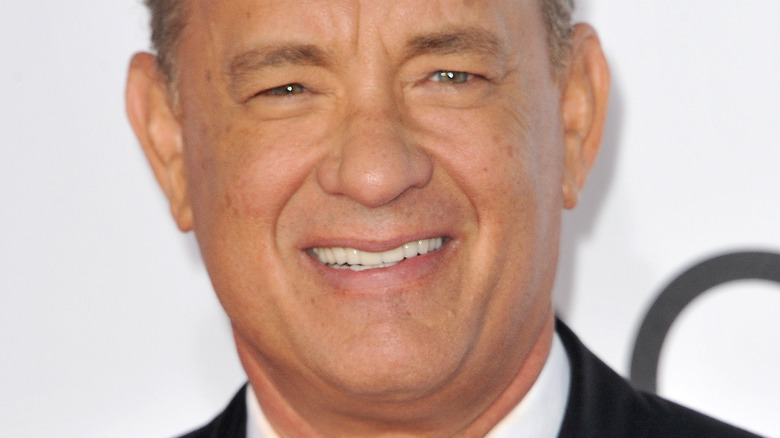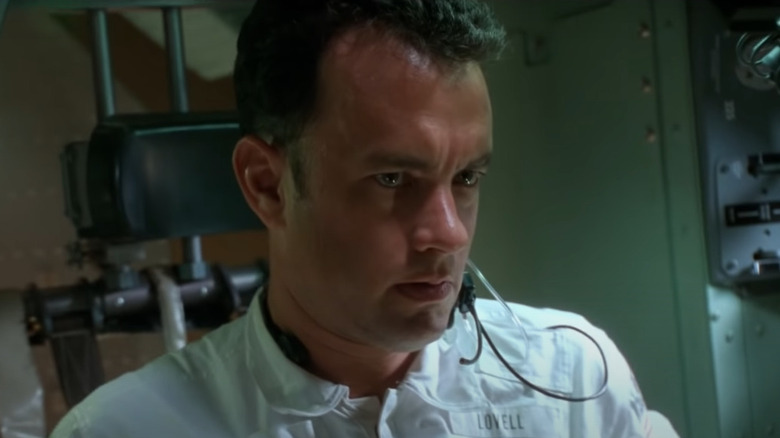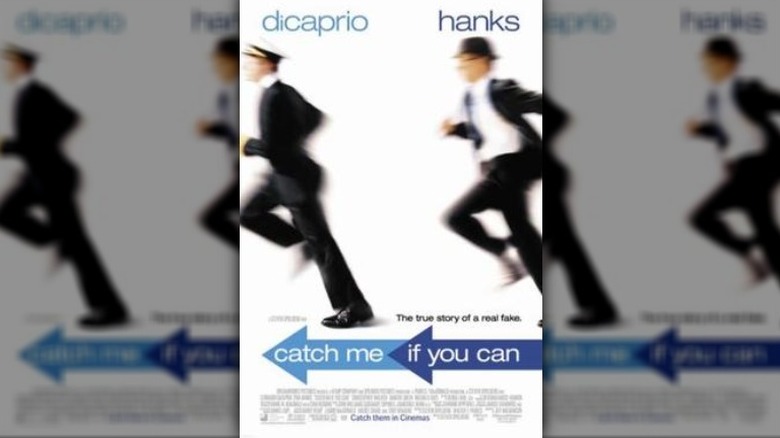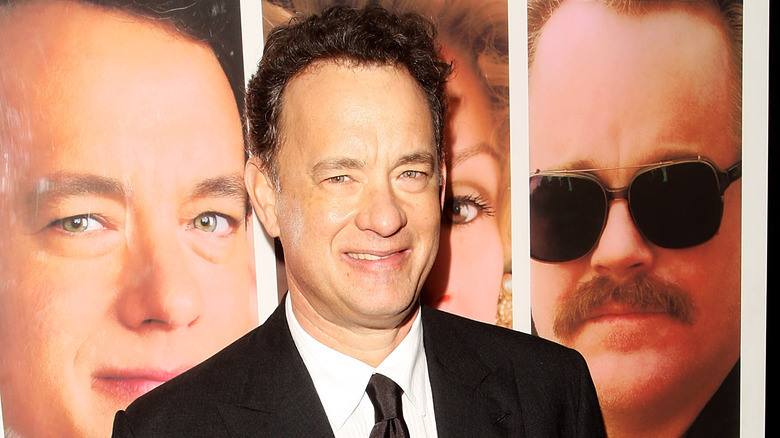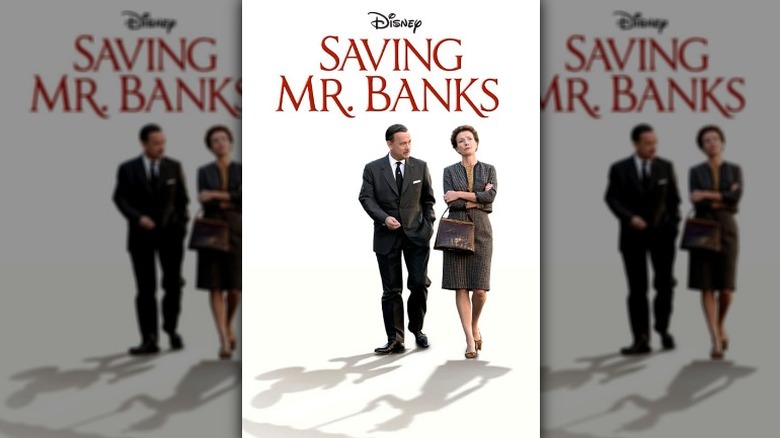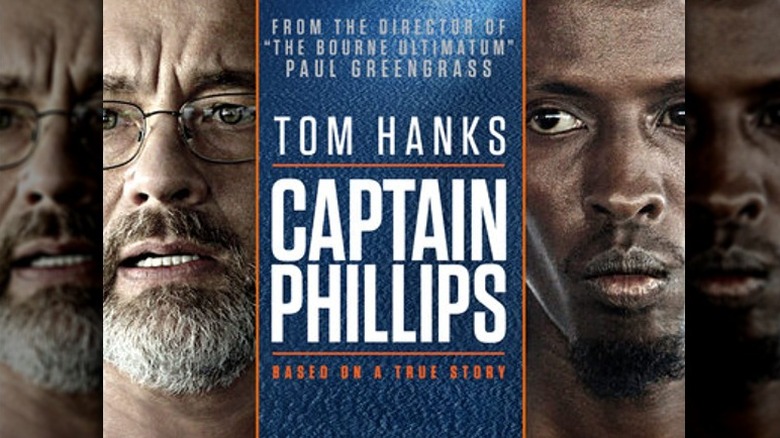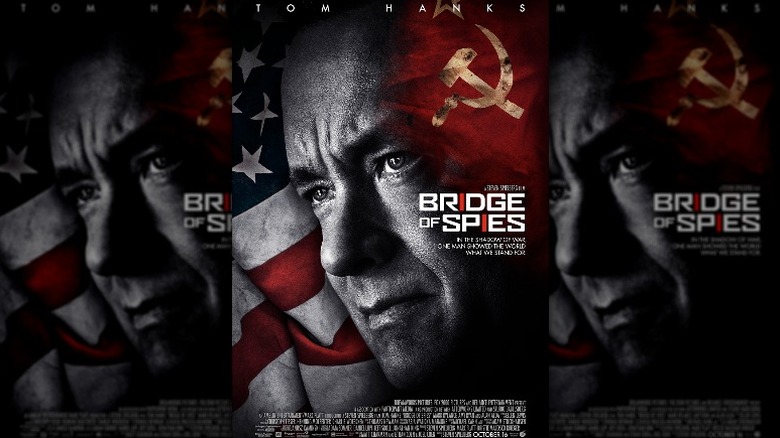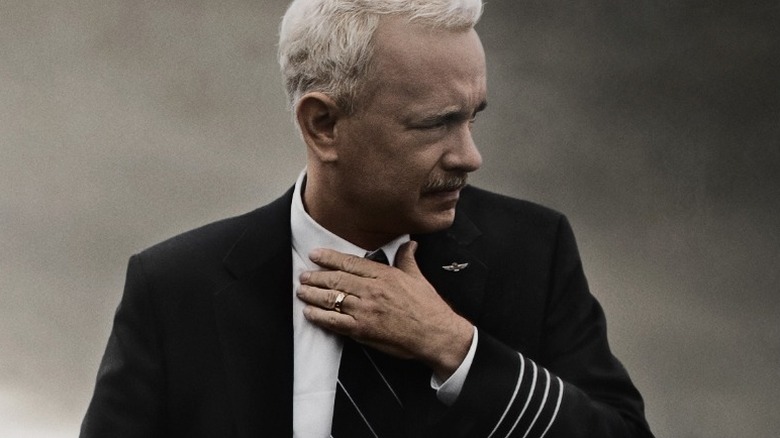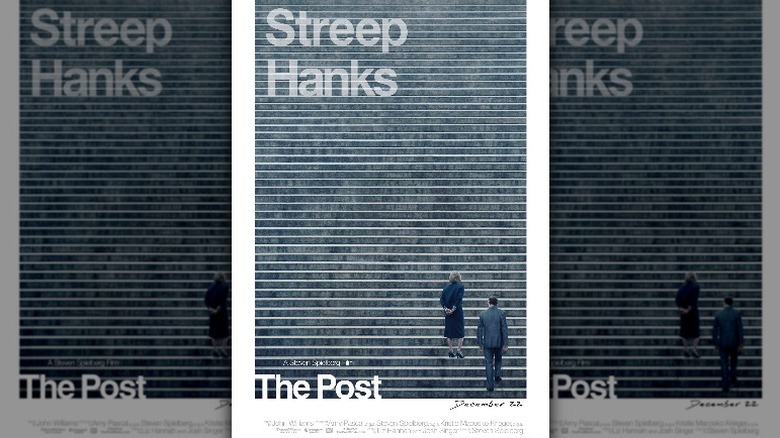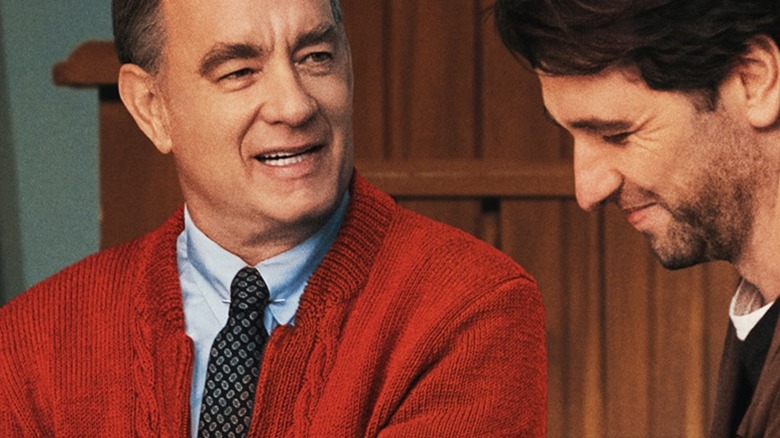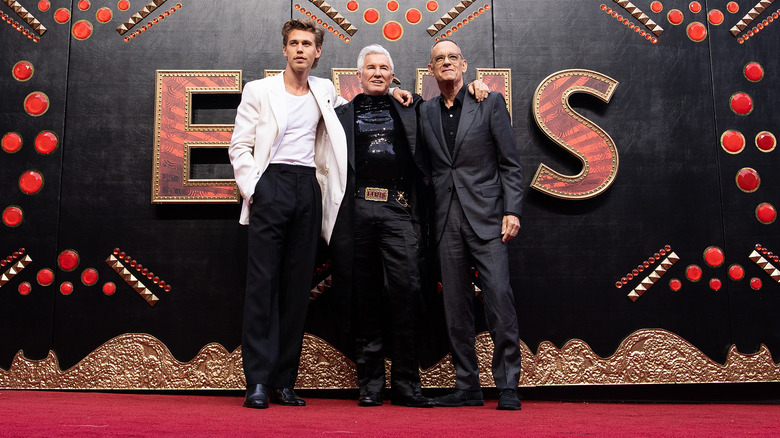The Best Biopics Tom Hanks Has Ever Been In
As "Weird Al" Yankovic once sang on "Last Week Tonight," nobody doesn't like Tom Hanks. The man's acting chops have brought him two Oscars (and, according to GOBankingRates, a box office of $5.57 billion as of 2020, via Yahoo Finance), and his decency and affability have brought him the nickname "America's Dad." That nice-guy reputation can be a slight hindrance to an acting career; Hanks admitted to The New York Times once that "bad guys, by and large, require some degree of malevolence that I don't think I can fake." But that "handicap," if it can even be called that, hasn't seemed to cost him too many offers.
Public credibility, and talent, have made Hanks a popular choice for filmmakers helming biopics. A genre built around true-life stories that celebrate remarkable individual achievement almost demands performers who can project likability. Of course, in trying to make such films sufficiently inspiring (and lucrative), biopic producers are sometimes loose with the true facts of the people they're meant to be about. Whether it's necessary for biopics to be strict with literal truth to be a worthy portrait, or just to be a good film, is an open question (see The Guardian for an attempt at an answer). Accurate or not, Hanks has been in quite a few film biographies that met with popular and critical acclaim. Here is the cream of his biographical crop.
Apollo 13 (1996)
Houston, Hollywood, and audiences worldwide had no problem with "Apollo 13." The true-life story of America's aborted seventh crewed Apollo flight netted nine Oscar nominations and critical acclaim. The New York Times called the 1996 film director Ron Howard's finest work to date, as did Rolling Stone. Consistent across many reviews was an appreciation for the absence of sentimentality or manipulation of the true events for the sake of Hollywood structure. This line of praise extended to the acting. "There's nothing showy in the 'Philadelphia' and 'Forrest Gump' mode in what [Tom] Hanks does here," wrote Peter Travers for Rolling Stone, "yet his acting as the unassuming Lovell ranks with his most impressive work." He also called Hanks' performance "instinctive and assured."
"Apollo 13" also picked up accolades for its scientific and historical accuracy. While some license was taken, transcripts of radio communications between NASA and Apollo 13 were relied on for large chunks of the film's dialogue (per WUSA9). And when it came to simulating the conditions of spaceflight, the movie went the extra mile. Speaking to Yahoo Entertainment, Howard said that, in the pre-digital age, he relied on the "Vomit Comet." Its real name is the KC-135 aircraft, and NASA uses them to achieve 20 to 25 seconds of weightlessness for training astronauts. With a little help from the real crew of Apollo 13, Howard secured permission to use the Vomit Comet for six months of filming.
Catch Me If You Can (2002)
Tom Hanks isn't the star of "Catch Me If You Can." That honor went to Leonardo DiCaprio as Frank Abagnale Jr., con artist extraordinaire ... or so he claimed, at any rate. The real Abagnale told a Steven Spielberg fan site (via IGN) that he was delighted with the director and DiCaprio handling his life story, despite him personally having no role in production. But that story, as told by Abagnale, has come into question more than once.
PBS reported on journalist Alan C. Logan's book "The Greatest Hoax on Earth: Catching Truth, While You Can" in 2021. Logan claims that the image of Abagnale as a dashing teenage rogue on the run in various guises for years was just another of the man's cons, that he really spent most of the time covered by the film behind bars and that he spun his myth to greater and greater heights as the years went by — something reporters had picked up on as early as the 1970s.
None of this made the movie any less popular on its release. "Catch Me If You Can" was a hit in 2002 and was widely praised for its snappy pace and the acting. The San Francisco Chronicle called Hanks' Carl Hanratty "the iconic '60s [G-man] from the collective American unconscious." The real agent on Abagnale's trail was named Joseph Shea, according to Variety; the name change was one bit of artifice that didn't come from Abagnale's cons.
Charlie Wilson's War (2007)
Biopics aren't often thought of as comedies. Yet when "Charlie Wilson's War" was nominated for best picture at the 2008 Golden Globes, it was in the Musical or Comedy category. Lou Lumenick in The New York Post described it as a farce and "a feel-good comedy about a covert U.S. effort to fund resistance to the Soviet invasion of Afghanistan." In the role of Charlie Wilson himself, Hanks won praise from, among others, Mick LaSalle of the San Francisco Chronicle. LaSalle considered it a rare walk on the sexy side by Hanks, and the film an unexpectedly handy primer on appropriations and the geopolitical situation of the 1980s.
Roger Ebert had similar compliments for Hanks, but his review implied a certain degree of skepticism of its accuracy. There was some distance between the real events and their depiction on celluloid, but not in the direction Ebert may have assumed. Former congressman Martin Frost claimed (via NPR) that things were far more wild than "Charlie Wilson's War" showed. "The story is true," he said — the story of Wilson's efforts on behalf of the Mujahideen — but the movie toned down Wilson himself.
"Charlie was really very flamboyant," said Frost. "And I think if they had portrayed him as flamboyant as he really was, no one would have believed any of this." The real Charlie Wilson, on the other hand, told CNN that the film hit very close to the mark, and that he greatly enjoyed it.
Saving Mr. Banks (2013)
"The only man who had played Walt Disney prior to me was Walt Disney himself," Tom Hanks told the BBC at the European premiere of "Saving Mr. Banks." Part of the generation that grew up watching Disney on television, Hanks felt that he "was like a combination of Smokey the Bear, the president of the United States, and Elvis Presely all rolled up into one." For some cynics, any portrayal of such an icon that doesn't poke holes in the image is a whitewash, even if many of the worst claims about Walt Disney are untrue (see The Jerusalem Post). But Variety considered Hanks the ideal and inevitable choice to play someone of Disney's reputation, and even a lukewarm review in the San Francisco Chronicle couldn't deny his charm.
If you take the word of the Sherman brothers (via YouTube), P. L. Travers was the one given a Hollywood gloss. Decades after the experience of trying to sell her on the idea of a "Mary Poppins" movie, the frustration is still plain to hear in Robert Sherman's voice when he thinks of her: "She was a witch!" Travers never came around to Disney's adaptation of her books either, per Vulture. But if "Saving Mr. Banks" isn't going to win any awards for historical accuracy, Emma Thompson's performance as Travers is just as responsible for its success among film critics as Hanks' Disney. The Hollywood Reporter even praised her over a hypothetical Meryl Streep in the part.
Captain Phillips (2013)
What makes a good protagonist for an action movie? Is it big muscles, a square jaw, or charismatic bravado? In "Captain Phillips," the answer was "none of the above;" the key quality was commitment to procedure. Tom Hanks' turn as Richard Phillips, diligently operating by the book as his ship is taken by pirates, was consistently hailed in reviews. Donald Clarke of The Irish Times compared his work favorably to actors James Stewart and Gary Cooper, often cast in the same sort of Everyman roles. "Hank's initial stoicism makes an eventual breakdown all the more moving," wrote Clarke.
But if Hanks' performance appealed to filmgoers, the movie itself didn't hold much charm for some of the real Phillips' crew. After "Captain Phillips" premiered, The New York Post reported on the unhappy reactions from crew members of the Maersk Alabama cargo ship. Several of them alleged that the real Phillips was an unpopular and insufferably arrogant captain who disregarded procedures to deter piracy, ignored warnings of increased piratical activity off Somalia, and misrepresented the circumstances of his being held hostage to make himself seem more heroic.
Phillips pushed back against all such claims, insisting that the latter issue came down to media spin. And "Captain Phillips" director Paul Greengrass defended his move in response to an AMA question (via The Wrap). He claimed to have spoken to all but one of the ship's crew in his efforts to ensure accuracy.
Bridge of Spies (2015)
Thirteen years after "Catch Me If You Can," Steven Spielberg and Tom Hanks teamed up to tell another true-life story with "Bridge of Spies." Hanks took the lead role this time as James B. Donovan, a lawyer committed to the principle behind the Sixth Amendment even as Cold War paranoia swept through America. Donovan's vigorous defense of a Soviet spy, and his later involvement in arranging the exchange of said spy for American prisoners held in East Germany, may get consigned to the footnotes in history books, but Spielberg and Hanks (and the Coen brothers, who share writing credit with Matt Charman) spun it into an acclaimed film.
The Chicago Sun-Times had plenty good to say about all their work, singling Hanks out for being "as good as anyone has ever been at playing men of great integrity and warm hearts who aren't to be trifled with when the heat is on." It was an approach that jived with the memories of the real Donovan's grandson and Donovan's own words: "If the free world is not faithful to its own moral code, there remains no society for which others may hunger" (per the Harvard Gazette). The film's overall accuracy to the period, and to the key details of the negotiations, were high, according to The Take — although the timing of the actual exchange was fudged in a few ways (per The Guardian).
Sully (2016)
An airplane collides with a flock of birds, has to make a crash landing, and no one gets seriously hurt. That sounds like the stuff of comedy or cartoons. Indeed, comics got plenty of mileage out of the fateful January 2009 flight of an Airbus A320 under Captain Chelsey "Sully" Sullenberger — see Norm Macdonald's bit on "Conan." A proper biopic, however, couldn't be so glib, and couldn't be solely about the crash. 2016's "Sully" devotes a good chunk of its 96-minute run time to the aftermath of the incident, with Tom Hanks' Sullenberger dealing with media attention and an investigation into how he handled the crash.
According to Variety, the real Sullenberger, and his flight crew and passengers from that day, were well pleased with how Hanks and director Clint Eastwood approached the story. Hanks and Sullenberger both wished that the film would speak to the best aspects of America, its can-do optimism, and the ability of its institutions to work properly. Sullenberger also appreciated Eastwood's attention to detail; as minor a mistake as his Air Force academy ring being yellow gold instead of white gold was subject to a post-production fix (per USA Today).
A rare objection to "Sully" came from the investigators responsible for looking into Sullenberger's actions, who objected to being portrayed more like prosecutors, according to PBS. Sullenberger shared their concerns with the script; while he conceded that it made for neater storytelling, but successfully lobbied to have the investigators' names unspoken.
The Post (2017)
Tom Hanks seems to be Steven Spielberg's go-to man for biopics and historical fiction. After "Catch Me If You Can" and "Bridge of Spies," Spielberg cast Hanks opposite Meryl Streep to headline "The Post." Streep plays publisher Katharine Graham, Hanks the journalist Ben Bradlee, and the film tells the story of The Washington Post's publishing of the Pentagon Papers that exposed the U.S. government's deception over the Vietnam War.
Released in 2017 — the year the Post adopted "democracy dies in darkness" as its slogan (per the Post itself) — the movie almost seemed to invite comparisons between the dilemma Graham and Bradlee found themselves in and journalism's role during the Trump administration. As IndieWire put it: "'The Post' unambiguously uses the past to reinvigorate our resistance to the present."
A timely story about the importance of good journalism has natural attractions for members of the fourth estate. The Post asked its former reporters for their thoughts and got unanimous praise. Bradlee's widow was particularly impressed with Hanks' performance.
But any movie that puts such a premium on telling the truth can expect scrutiny into its own accuracy. Politifact took a fine comb to "The Post" and found instances of both great fidelity and significant dramatic license. And Roy J. Harris Jr. of Poynter was torn between praise for the movie and Streep, and sharp rebuke for its minimizing of the role The New York Times played in exposing the Pentagon Papers.
A Beautiful Day in the Neighborhood (2019)
What media personality could be more wholesome and appealing than Tom Hanks? How about Mr. Rogers? So what happens when Tom Hanks plays Mr. Rogers? For millions of filmgoers, the answer was delightful. "A Beautiful Day in the Neighborhood" holds ratings above 90% by both critics and audiences on Rotten Tomatoes. A fact-checker or a historian might give it lower marks on technical grounds, however.
While based on an article for Esquire by journalist Tom Junod, the film depicts Rogers' influence on Lloyd Vogel. While inspired by Junod, Vogel's experience with Rogers departs from his in key ways — some of them detailed by Junod himself in The Atlantic. He recalled that screenwriter Micah Fitzerman-Blue warned him ahead of time that the relationship he shared with Rogers was accurate, but that everything else about his character's life was fabricated.
The stark differences between his actual home life and Vogel's made Junod request that the character's name be changed. But that didn't stop him from not just enjoying the movie, but being deeply moved by it. He wasn't the only one. "Once you get past the loose handling of the truth, there's a warm hug waiting for you in 'A Beautiful Day in the Neighborhood,'" wrote Benjamin Lee for The Guardian, "and one that arrives with far less sentimentality than expected. Rogers always respected his audience, no matter the age, and [director Marielle] Heller follows suit."
Elvis (2022)
Director Baz Luhrmann has attracted many adjectives over the course of his career, but "naturalistic" and "realistic" aren't among them. There aren't many reviews of 2022's "Elvis" lauding it as a human-scale docudrama-type biopic. "Hyperactive, showy, and gleefully un-subtle" is how Slate's Jack Hamilton put it in a generally negative review. He also considered Tom Hanks miscast as the unscrupulous Colonel Tom Parker. It's a sentiment — rare in Hanks' career — that has appeared in several critiques of "Elvis." USA Today found his accent distracting and Parker's role in the film unclear. Hanks himself admitted that he was surprised to be cast in the part when interviewed on "Late Night with Seth Meyers."
But USA Today also said of "Elvis," "With [Austin] Butler's stellar portrayal, it is never dull, and it's more enjoyable than not." And the film has garnered generally good reviews, and Hanks with it. Variety found the choice to position Parker as the unreliable, ambivalent narrator a captivating echo of another Luhrmann character. "Hanks, with his mustache-twirling accent and avaricious gleam, makes Parker a cousin to Jim Broadbent's nightclub impresario in 'Moulin Rouge!' — a corrupt showman who will do and say anything to keep the show going."
